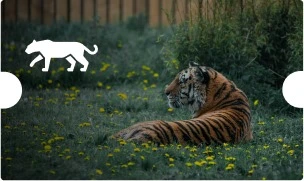Kaziranga National Park
Experience the thrill of a Safari In Kaziranga National park, Assam and witness the elusive leopards in their natural habitat!
Starting From
Coming Soon
Per Pax

Overview

Fast Facts:
- World’s Largest Population of One-Horned Rhinos: Over 2,400 one-horned rhinos call Kaziranga home, making it the best place to see these majestic creatures.
- High Tiger Density: The park has the highest density of tigers in the world, with an estimated 100 tigers residing within its boundaries.
- Rare Golden Tiger: Kaziranga is one of the few places where the rare golden tiger, known for its distinctive pale gold coat, has been observed in the wild.
- Endangered River Dolphins: The Brahmaputra River, flowing through the park, is home to the endangered Ganges river dolphin, adding to the park’s rich aquatic biodiversity.
Flora
Kaziranga National Park boasts a rich diversity of plant life that enhances its wildlife habitat. The landscape is dominated by tall elephant grass in the western lowlands, providing crucial cover for many species. Scattered trees such as kumbhi, Indian gooseberry, and cotton trees offer shade and refuge. Along the Brahmaputra River, aquatic plants like water lilies, lotus, and water hyacinth thrive. Seasonal flooding creates pockets of swampy areas and moist forests, contributing to the park’s vibrant and varied flora. This botanical richness supports the park’s exceptional biodiversity.
Fauna
Kaziranga National Park's diverse habitat supports an impressive range of wildlife. It houses the world’s largest population of one-horned rhinoceros and the highest density of tigers globally. Herds of wild water buffalo and swamp deer graze the grasslands, while elephants and gaurs roam the forests. Predators like leopards, jungle cats, and fishing cats add depth to the ecosystem. The park also shelters all of India’s free-ranging primates (excluding Western Ghats endemics). Birdwatchers can enjoy spotting over 478 species, including eagles and herons, while smaller mammals like the rare hispid hare enrich Kaziranga’s biodiversity.
Best Time To Visit
- Best Time to Visit: November to April for optimal weather and wildlife viewing.
- Weather: Comfortable and pleasant, ideal for exploring and spotting wildlife.
- Visibility: Reduced grass height enhances wildlife spotting opportunities.
- Monsoon Season: From May to October, flooding may make the park inaccessible.
- Optimal Viewing: Maximise chances of seeing rhinos and tigers between November and April.
How To Reach
- By Air: The nearest airports are Lokpriya Gopinath Bordoloi International Airport in Guwahati (217 km away) and Jorhat Airport (96 km away). From either airport, you can hire a cab or taxi directly to the park, or take a bus to the park entrance at Kohora.
- By Train: The closest railway station is Furkating Junction (75 km away). Guwahati and Jorhat also have railway stations, though they are further away (240 km and 90 km respectively). From these stations, taxis, cabs, or buses can be used to reach the park.
- By Road: Kaziranga National Park is well-connected by road. Buses from major cities in Assam, such as Guwahati, Tezpur, Jorhat, and Dimapur, travel to the park entrance at Kohora, which is situated on National Highway 37 (NH 37).
Jhalana Leopard Safari Price
| – Indian Nationals (Per Pax) | -INR 1250 |
| – Exclusive Jeep Indian Nationals | -INR 6800 |
| – Non-Indians (Per Pax) | -INR 2200 |
| – Exclusive Jeep Non-Indians | Starting From -INR 8000 |
| Note:- Only 6 Person are Allowed per Safari Vehicle | |
| Period | Morning | Afternoon |
| 1 August to 31 October | 6.45AM – 09.15AM | 3.45PM – 6.15PM |
| 1 November to 31 January | 7.00AM – 9.30AM | 3.15PM – 5.45PM |
| 1 February to 31 March | 6.15AM – 8.45AM | 3.45PM – 6.15PM |
| 1 April to 31 May | 5.45AM – 8.15AM | 4.15PM – 6.45PM |
| 1 June to 31 July | 5.45AM – 8.15AM | 4.45PM – 7.15PM |
Booking Form
Know Before you Go
- Full permit fees must be paid in advance for safaris.
- Carry the same ID proof provided during booking; it's mandatory for all visitors.
- Bookings are non-transferable and cannot be exchanged with anyone.
- Foreign tourists must provide passport details during reservation.
- Use any valid government document like Aadhar, DL, PAN Card, Voter ID, or Passport for reservations.
- Safari permits are issued on a first-come, first-served basis, subject to availability.
- Full refunds will be issued for unbooked safaris due to technical errors or seat unavailability.
- The park may close without prior notice from the state forest department.
- Visitors must pay any fee difference if there is a revision after booking.
- We act as a travel agent for safari bookings and are not responsible for accidents, injuries, thefts, or deaths during safaris.
- The selection of safari drivers and naturalist guides is determined by the forest department's automated system.
- Vehicle allotments (boarding passes) are issued on the same day as the safari date.
FAQ
Kaziranga National Park is located in the northeastern state of Assam, India, along the Brahmaputra River.
Kaziranga is renowned for its large population of the Indian one-horned rhinoceros, tigers, elephants, wild water buffalo, and diverse bird species.
The best time to visit Kaziranga is from November to April. The park is closed during the monsoon season (May to October) due to heavy rainfall and flooding.
The nearest airport is in Jorhat (approximately 97 km away), and the nearest railway station is in Furkating (approximately 75 km away). The park is also accessible by road from major cities in Assam.
There are various accommodation options ranging from luxury resorts to budget guesthouses and eco-camps, catering to different preferences and budgets.
Yes, it is generally safe to visit Kaziranga. The park authorities take extensive measures to ensure the safety of visitors and wildlife.
Besides the famous one-horned rhinoceros, Kaziranga is home to the rare golden tiger, which has a distinctive pale gold coat with light brown stripes.
Spotting the golden tiger is extremely rare, but Kaziranga is one of the few places where this unique variant has been observed in the wild.
Visitors can support conservation by following park guidelines, respecting wildlife habitats, and contributing to local conservation organizations and initiatives.
Trending Now
Experience the thrill of a Jhalana Leopard Safari and witness the elusive leopards in their natural habitat!
We're Also Providing
Experience the thrill of a Jhalana Leopard Safari and witness the elusive leopards in their natural habitat!

Book Cabs
Starts From ₹3000
View Details →

Book Flights
Starts From ₹8200
View Details →

Book Hotels
Starts From ₹3500
View Details →

Book Safaris
Starts From ₹1250
View Details →




